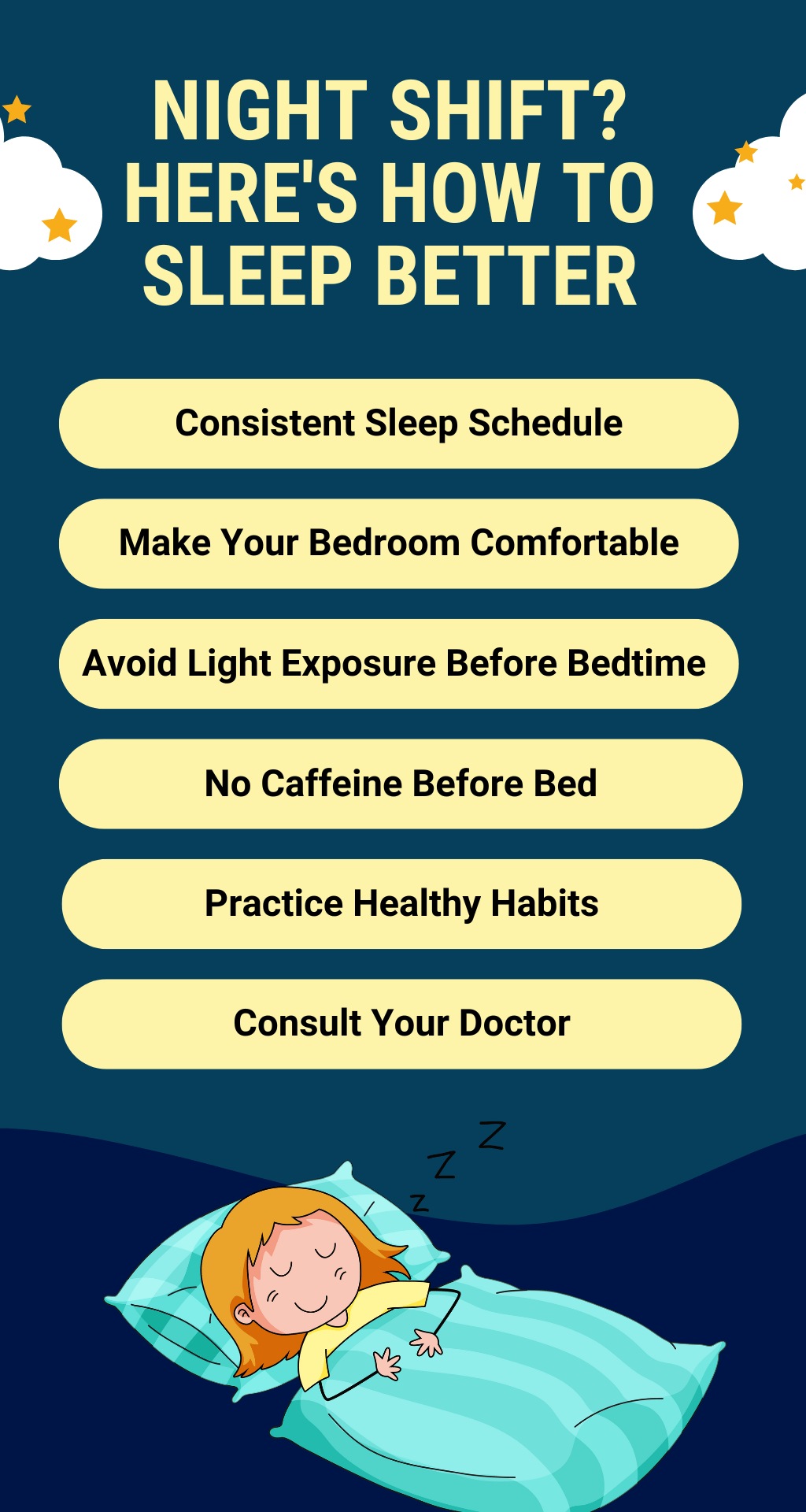Working the Night Shift? 6 Nurse-Approved Tips for Better Sleep Quality
Struggling with sleep after working the night shift? Learn about circadian rhythm disruptions and get 6 practical tips for better sleep.
HEALTH & WELLNESS MADE SIMPLE
Sheri Anne Maximille Cabañes-Madayag
4/27/20255 min read


Note: This post is for informational purposes only and is not a substitute for professional medical advice. Please speak with your healthcare provider about your specific health concerns.
Getting enough sleep is a challenge if you're working the night shift. I get it. As a former nurse and now a virtual assistant and copywriter, I have the same struggles.
I used to work as a nurse in the hospital. I have worked different shifts, including the night shift. As a virtual assistant and a copywriter, I also need to work at night. Most of my clients are based abroad, with a 12- to 16-hour time difference from the Philippines, where I live. Given my irregular work schedule, I have always struggled with getting enough sleep.
In this blog post, I will be discussing sleep disorders. I am also sharing practical tips on how to get quality sleep for night shift workers.
Circadian Rhythm
Our body follows a pattern that tells us when to sleep and when to wake up. This is called the circadian rhythm. Commonly referred to as "biological clock", circadian rhythm regulates the body's processes during a 24-hour period. It is naturally guided by the brain, but it can also be affected by other factors outside the body. Outside factors light exposure, food intake, stress, physical activity, temperature, and social environment, have significant impacts on circadian rhythm.
Circadian Rhythm Disorders
Circadian rhythm helps ensure that the body is functioning at its best. Disruptions in sleep-wake cycle can lead to circadian rhythm disorders. Several factors can disrupt the sleep-wake cycle, and below are the most common causes of circadian rhythm disorders:
Working night shifts
Traveling in a different time zone (jet lag)
Changes in sleep routine
Medications and substances like alcohol and caffeine
Stress
Hormonal changes, such as in pregnancy or menopause
Health conditions, including Alzheimer's or Parkinson's disease
Mental health disorders
Common symptoms of circadian rhythm disorders include insomnia (trouble falling asleep or staying asleep), daytime sleepiness, fatigue, headache, and mood changes.
Circadian rhythm disruptions can have negative health effects. Studies have shown that night shift workers have higher rates of metabolic syndrome (high blood glucose, high blood pressure, and high blood lipids), which increases the risk of developing type 2 diabetes and heart disease. There is also an increased incidence of breast cancer in women who work night shifts.
Shift Work Sleep Disorder (SWSD)
One type of circadian rhythm disorder common among night shift workers is called shift work sleep disorder (SWSD). It affects 10 to 40% of people who work nontraditional hours outside the usual 9 AM to 5 PM work hours. Symptoms of SWSD include insomnia, excessive sleepiness, difficulty concentrating, headaches, lack of energy, depression or mood changes, and trouble with relationships. Diagnosis of SWSD is usually done through assessing sleep patterns, a sleep diary, and conducting a sleep study (called polysomnography), along with other tests. Common treatment for SWSD include improving sleep quality, bright light therapy, melatonin supplements, and sleep medications.
Make sure to consult your doctor if you wish to take any supplements or medications to ensure your safety. These supplements and medications may have harmful effects on your health if not taken properly.
Tips to Improve Sleep Quality
Night shift workers often struggle with sleep due to their irregular schedules. While it may not be that easy to change your work schedule, there are ways that you can get good quality sleep despite working the night shift. Below are some tips that I have used to make sure I am still well-rested even when I work at night.


1. Establish a Consistent Sleep Schedule ⏰
Set a sleep schedule and stick to it consistently. Target at least 7 to 8 hours of sleep. Take into account the time your shift ends, travel time from your workplace to home, plus other activities you usually do before bedtime. For example, if your shift is from 10 PM to 6 AM, you can set your bedtime from 9 AM to 5 PM. Go to bed and wake up at the same time daily, even on your days off. This helps regulate your body's natural sleep-wake cycle.
2. Make Your Bedroom Comfortable 🛏
Make sure your bed is only used for sleeping. Do not do other activities related to work on your bed. Keep your bedroom dark, quiet, and cool. To block light from outside, use dark curtains or an eye mask. Use earplugs or a white noise machine, like calming music or the sound of air conditioning, to mask the noise from outside. A cool environment promotes better sleep, so use an electric fan or air conditioning, if possible.
3. Avoid Light Exposure Before Bedtime 📵
Bright lights can alter melatonin production, a hormone that regulates sleep. Avoid light exposure at least 1-2 hours before sleeping. Strictly follow the "no screen time" rule before bedtime. This includes not using your phone, tablet, or computer at least an hour before bed. I, too, am guilty of using my phone before bed, which messed up my sleep. So I try my best to follow the "no screen time" rule to help me fall asleep faster. One thing that has helped me is setting an alarm as a reminder to keep gadgets away before bedtime.
4. Avoid Caffeine Intake Before Bed ☕️
Do not drink coffee, tea, soda, chocolate, energy drinks, or any caffeinated beverages at least 6-8 hours before bedtime. It is also recommended to limit your coffee intake to 1-2 cups per day. On the other hand, you can try some drinks that may help you sleep, such as warm milk or chamomile tea. I tried chamomile tea, and it did help me fall asleep faster.
5. Practice Healthy Habits
Living a healthy lifestyle is not only beneficial for better sleep but also maintains your overall health.
Diet
Eat a balanced diet rich in protein, fiber, and healthy fats to sustain your energy levels. Prioritize whole foods over processed snacks that are high in sugar to avoid energy crashes. Stay hydrated and limit caffeine intake.
Physical Activity
Regular exercise relieves stress and improves sleep quality. The American Heart Association (AHA) guidelines recommend at least 150 minutes of moderate-intensity aerobic activity per week. If it sounds too much, especially if you're only getting into exercise, just try to move more throughout the day. Increase the intensity and frequency as you get physically stronger. Choose exercise activities that you enjoy so you'll likely stick to them.
Protect Your Mental Health
Manage stress by practicing relaxation techniques such as deep breathing, meditation, and mindfulness. Engage in hobbies or activities outside work that you enjoy. Explore your creative side through writing, painting, photography, music, and other activities that let you unwind. Communicate regularly with family and friends to reduce feelings of isolation.
6. Seek Consultation
Talk to your doctor if you experience persistent trouble with sleeping. A qualified health professional can assess your condition and provide interventions that help address your sleep problems.
Start Getting Quality Sleep Now
Night shift work is one of the most common factors that disrupt the sleep-wake cycle. But that doesn't mean your health has to suffer. Start making small changes to get quality sleep now. Your future well-rested self will thank you.
Disclaimer: This blog post is based on personal and professional experience and is intended for informational and educational purposes only. This is not a substitute for professional medical advice, diagnosis, or treatment. Always consult with your healthcare provider for specific questions or concerns regarding your health.
